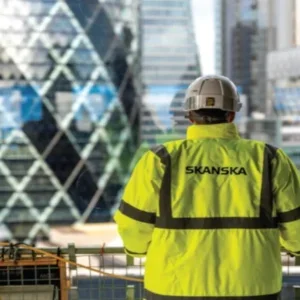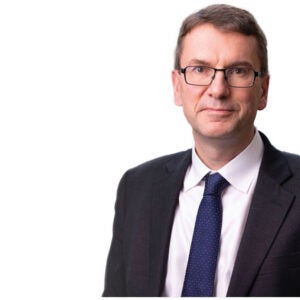
To limit the increase in global average temperatures to 1.5°C, emissions need to halve by 2030 and drop to net zero by 2050 for the best chance of avoiding the worst effects of climate change.
Finance directors of major companies have a big role to play in the fight against global warming – raising and allocating the funds for transition and adaptation, embedding greenhouse gas reductions within decision-making processes, and accurately tracking and reporting performance against reduction targets over time.
At the end of 2019, National Grid, along with other high-profile signatories from some of the largest companies in Europe, signed an Accounting for Sustainability (A4S) pledge to help mitigate the effects of climate change. Andy Agg, National Grid’s CFO, explains how the company plans to reduce its impact on the environment over the coming years.
You recently signed a statement in support of reducing greenhouse emissions by the middle of the century. How are you planning to achieve this goal?
Last year, National Grid announced a goal of net-zero carbon emissions by 2050, an increase on our previous goal of 80% by 2050. We have already reduced our emissions by 70% from the 1990 baseline, and we have stretching plans to deliver the remaining 30%. Some of the actions we are taking to meet this goal are:
- developing and using innovative alternatives to polluting gasses such as SF6 across our electricity networks
- accelerating the replacement of leak-prone pipes on our gas distribution networks in the US
- reducing the need to vent quantities of methane on our UK gas transmission networks
- moving to a fully electric vehicle fleet.
As well as having ambitious targets to reduce the emissions of our own activities, we have also stepped up our efforts in the wider enabling role we play in decarbonising society as a whole. Examples of our successes here include:
- streamlining the process for renewable generation to connect to our system
- putting forward proposals for an ultra-fast charging network for electric vehicles to reduce the range anxiety that comes with owning an electric car
- running advanced research pilots into how blended methane and hydrogen could be used in industry and to decarbonise heating.
How can firms strike the right balance between making a profit and being socially responsible?
I don’t see profitability and being socially responsible as mutually exclusive – in fact, they are fully aligned. Now, more than ever, we have a responsibility to demonstrate our contribution to society more broadly – whether that’s by making sure young people today become the problem solvers of tomorrow, or in tackling climate change by reducing our own emissions and helping our customers use energy more efficiently.
In particular, regulated network companies like National Grid have a responsibility and duty to the communities we serve to deliver safe, reliable energy, and to invest in sustainable, cleaner networks for the future. A profitable company can deliver the investment our stakeholders require, while creating skills and employment for our workers, and enabling us to give back to the communities we are a part of.
When it comes to reducing emissions, what role do corporations’ finance directors play?
CFOs play a critical part in influencing the metrics used to appraise and sanction future investments, allocating and setting budgets, and identifying performance indicators for internal reporting – and this includes metrics around sustainability. Last year we set a 2050 target to reduce our own emissions to net zero, as well as more challenging interim targets to reduce our emissions by 80% by 2030 and 90% by 2040. We have also recently committed to reducing our scope-three emissions by 20% by 2030.

As CFO, I have the ability to champion sustainable reporting at the board level, embed this into the daily activities of the finance function and hold the operational elements of a business to account on any decarbonisation targets, as well as the costs associated with achieving them. To do this in the area of sustainability is a natural extension of the CFO’s role across the business.
In what ways will companies’ efforts to mitigate climate change be affected by the Covid-19 crisis?
Coming out of the pandemic provides a real opportunity to accelerate away from carbon-intensive processes and towards a green recovery. In our recently published Responsible Business Charter, National Grid has committed to maintaining levels of investment in our infrastructure and demonstrating the social benefits of our capital delivery programmes. We will also continue to invest in developing technologies and innovations that benefit our customers and wider society. What’s more, none of our emission reduction targets have changed because of Covid-19. All of this enables us to create new jobs and provide skills training to 45,000 people by 2030.
“Coming out of the pandemic provides a real opportunity to accelerate away from carbon-intensive processes and towards a green recovery… National Grid has committed to maintaining levels of investment in our infrastructure and demonstrating the social benefits of our capital delivery programmes.”
2050
National grid aims to have achieved net-zero carbon emissions.
National Grid
How is AI being utilised to reduce emissions?
National Grid is embracing many of the opportunities that new technology brings. There are many ways we do this, but one small example is in our electricity system operation function in the UK where, in collaboration with the Alan Turing Institute, we have used data science and machine learning to deliver a 33% improvement in solar forecasting. This will help us run the system more efficiently, and enable more solar capacity to be connected and utilised.
How do you think CFOs can work together and share information to achieve a carbon-free economy?
I have been proud to be part of the Prince of Wales’ A4S organisation for many years. This allows CFOs of major corporations across the UK, Europe, North America and beyond to come together regularly and discuss sustainability, exchanging information on initiatives they have within their organisations and encouraging us to set more ambitious goals on this journey. A4S also brings together corporations, investors and standard setters, so any changes in the decarbonisation landscape are quickly communicated to key decision-makers who can enact them within their organisations.
What adaptations have you made to lead your finance team through the current crisis?
Like all executives, I have had to adapt to home working and the lack of face-to-face contact. The IT infrastructure we have at National Grid enabled a smooth transition, and our systems and processes have adapted really well. I have made it a focus to step up my engagement with the wider finance team, holding regular virtual town halls and other interactive online meetings where I can share the latest updates with the team – and importantly hear from them their experiences of home working and any issues they may be having. While in some ways remote working has been challenging, I also think it has led to greater interaction across our organisation. Our teams have certainly embraced the new tools we have introduced for asking challenging questions.
Externally, Covid-19 has changed the way we interact with our investors as well, with our recent full-year investor roadshow being 100% virtual. On some days I would be talking to Australian investors first thing in the morning and finishing on the West Coast of the US in the evening – certainly a saving on air miles. We recently hosted a virtual environmental, social and governance investor seminar, allowing for hundreds of investors around the world to participate, which was really exciting. We are finding new ways to deliver our message to our stakeholders. Whether a return to ‘normal’ is imminent or not, we are establishing new ways of working that will stay with us going forward.
You’ve been in the role for over a year; what advice would you give yourself looking back to when you first began?
If I look back over the past couple of years it would be hard to imagine the macroevents and other developments we have seen – so I think I would continue to advise myself to be prepared for anything and look on every challenge as an opportunity to learn – both for myself and my team – and embrace all the variety that life throws at us.
The recent events have shown that established norms can change very quickly. You have to be open to being responsive and finding new ways of doing business and, in effect, I think we have all become change or transformation leaders. I have a great team around me and couldn’t do this job without them, and we constantly challenge each other to be the best we can be. The future is really exciting for National Grid as we find innovative ways to tackle climate change, and I’m delighted to be a part of it.






